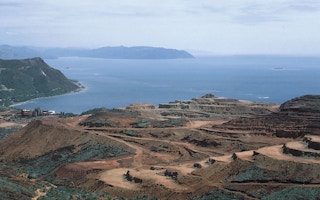An area larger than Singapore has already been deforested to make way for nickel mines in Indonesia with a further half a million hectares of forest under threat as the Southeast Asian country pursues its ambition to be the world’s hub for electric vehicle (EV) battery minerals.
An investigative report of 329 Indonesian nickel concessions by United States-based non-government organisation Mighty Earth and Indonesian partner organisation Satya Bumi found that the rate of forests lost to nickel mining is accelerating, with the number of deforestation alerts in mining concessions doubling between 2020 and 2023.
Indonesia is the world’s largest nickel producer – the country has one fifth of global nickel reserves, which are mostly located in the eastern provinces of Sulawesi and Maluku. The country is aiming to be one of the world’s top three producers of EV batteries by 2027, an ambition that has worried environmentalists and human rights campaigners.
Mining has overtaken palm oil as Indonesia’s biggest source of deforestation while nickel mining has prompted protests over worker safety after miners were killed at an extraction site in Sulawesi last year.
“
Does the new government recognise that Indonesia’s future lies in providing sustainable products, or will we see a return to the bad old days?
Amanda Hurowitz, senior director, Mighty Earth
Mighty Earth’s study, From Forests to Electric Vehicles, analysed 25 nickel mining concessions in detail and found that six concessions are 75 per cent covered by forest considered high carbon stock, or of key climate value. More than a quarter are considered by International Union for the Conservation of Nature (IUCN) to be important habitats for wildlife protection, and are home to species including the babirusa and the critically endangered maleo bird.
In some parts of Sulawesi, nickel mines have been operating illegally in protected forest areas or are sited too close to the ocean, raising pollution concerns. Mine runoff typically contains carcinogenic substances which can cause downstream damage to coral reefs.
On Kabaena island off the coast of Sulawesi, nickel mining companies have illegally cleared protected forests and did not seek free, prior and informed consent from local communities before the land was developed, Mighty Earth’s report finds.
Kabaena inhabitants include Bajau seafarers, considered the world’s last “sea nomads”. Some have reported health problems from contaminated freshwater and seawater, as well as livelihood impacts from declining fishing catch and ruined seaweed farms. More than three quarters of Bajau seafarers surveyed by Mighty Earth said they have received no compensation from mining companies for health and livelihood impacts.
Though nickel supply chains are murky, the major buyers of Indonesian nickel potentially include United States-based EV brand Tesla, Korean automakers Hyundai and Kia, Japanese carmakers Toyota and Honda, and German brands Audi, BMW and Mercedes-Benz.
The biggest deforestating nickel mining companies have links to China, the world’s largest market for electric vehicles. The companies responsible for the most forest loss in 2022 were Vale Indonesia, Aneka Tambang, Bintang Delapan Mineral and Mulia Makmur Perkas, the report found.
As well as forest loss, Indonesia’s nickel industry poses an additional climate threat from its reliance on coal to process the mineral. Coal-powered nickel refinery operations in Indonesia now exceed in size all coal power plants in Pakistan, a country heavily reliant on coal for power.
‘Responsible’ nickel mining
Annual demand for nickel is expected to triple by 2030, with pressure on eastern Indonesia’s forests and water bodies projected to increase in parallel with transport electrification and net-zero goals, unless measures are taken to improve mining practices.
Incoming president Prabowo Subianto has signalled that he will build on the policies of current premier Joko Widodo, also known as Jokowi, by aggressively expanding Indonesia’s nickel mining industry. In a panel discussion on Wednesday, Amanda Hurowitz, senior director at Mighty Earth, said that Prabowo has the opportunity to emulate Jokowi’s success in reducing deforestation from agriculture by enforcing the country’s forestry laws and expanding regulations to minimise environmental impacts from nickel mining.
“Does the new government recognise that Indonesia’s future lies in providing sustainable products, or will we see a return to the bad old days?” she said, referring to the era of massive deforestation driven by commodities such as palm oil and pulp and paper.
In a series of recommendations for mining companies, Mighty Earth said that nickel mining supply chain actors should join the Initiative for Responsible Mining (IRMA), the only independent third-party programme for assessing mine sites, and adopt its standards.
In addition, EV manufacturers should audit their supply chains to trace the nickel they buy back to where the material was mined. This is a requirement under the United States Inflation Reduction act and the European Union Battery Regulation, regulations partly introduced to clean up to improve the sustainability of global clean energy supply chains.
The non-profit also called on miners to site mines on already-developed land to protect critical habitats and the government to consider a moratorium that prevents new permits for captive coal plants to smelt or refine nickel.
Hurowitz said pressure to clean up Indonesia’s nickel trade will also be driven by electric carmakers. “If EV automakers insist on zero deforestation and zero coal [from the nickel they source], they will get it,” she said.
Nickel mining in Indonesia is dominated by Chinese firms, which Hurowitz said are not immune to criticism over their environmental and social impact. “China may not be an environmental leader, but it does not want to be a laggard, she said.

















